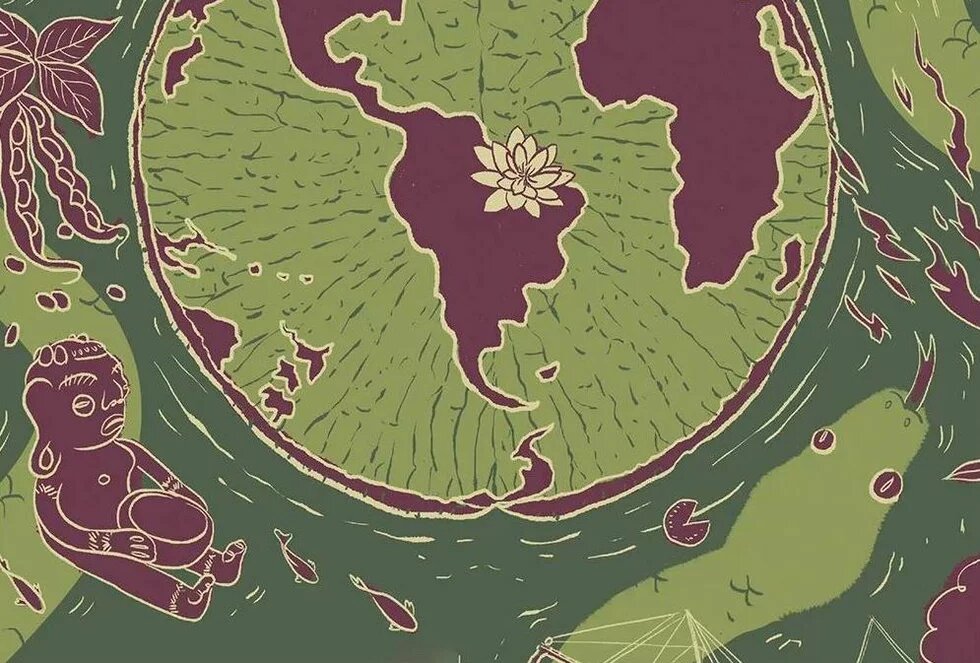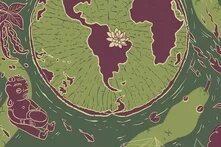Since its colonization, the Amazon region has served as a projection surface for foreign ideas and desires. With the Brazilian Amazon Atlas, we want to deconstruct common stereotypes about the region - and show it from the perspective of its diverse inhabitants.

Since the Portuguese occupation, the Amazon region has served as a container for projections brought from outside – beginning with the very name “Amazon,” derived from Greek mythology, given to the largest river in the region by the Spanish captain Francisco de Orellana in the 16th century. Other nicknames for the region did not consider the inhabitants who lived and cultivated the forest for thousands of years either. These included “gateway to paradise” and “Eldorado,” nicknames given by colonizers, and “green hell,” the latter given by the Brazilian military dictatorship (1964–1985) that commanded its neocolonization centuries later. Throughout this time, the practices and ontologies of the local inhabitants continued to be suppressed, whether through catechization or genocide, while their territories were violently seized and privatized, based on destructive notions, or even supposedly sustainable ones, although still immersed in the ideal of development.
Between the promise of progress and climate crisis
The Amazon has transformed itself, integrating the various changes with an admirable degree of resilience. However, new threats are emerging, still in the wake of developmentalist promises of progress. Mining and infrastructure projects, combined with the advancement of the agribusiness production model and its extensive monocultures, are increasingly depleting natural resources, imposing a turning point on the Amazon. This is happening at the exact moment when solutions are finally being sought for the imminent climate collapse – both means of mitigation, through carbon absorption, and ways of adapting to the global civilizational crisis.
Consequently, many are turning their attention to the region and to those who, despite being under constant threat, through essential multi-species interaction, have managed to preserve it and keep it standing: Indigenous and traditional peoples.
For the rights of people and nature
As a German political foundation, we have closely followed all these changes and tensions since we first started operating in Brazil in 2000. We seek to support and promote dialogue on the various issues surrounding resistance in the Amazon region, such as human rights, the rights of Indigenous peoples, biodiversity, agroecology, climate justice, and flying rivers. We always value the role of those who have been confronting predatory economic sectors for generations, often succumbing at the hands of their representatives. For us, the defense of the territorial rights of these peoples and their ways of living must be at the center of the debates on any solution to the challenges faced by the Amazon.
With this Brazilian Amazon Atlas, we seek to deconstruct stereotypes about the region. This content aims to contribute to an urgent change in perspective, so that people in Brazil and all over the world can get to know the Amazon again – this time from the perspective of the region’s diverse inhabitants. To this end, we gathered together an editorial board made up of scholars, activists, and communicators from the Amazon – or those who have been working in the region for decades – to identify local authors and topics to be addressed. As a result, the 32 articles in this Atlas were produced by a majority of authors from different parts of the Amazon. Such choices also took into account racial, ethnic and gender diversity.
This content aims to contribute to an urgent change in perspective, so that people in Brazil and all over the world can get to know the Amazon again – this time from the perspective of the region’s diverse inhabitants.
Furthermore, this atlas represents a change in perspective for the Foundation: It is the first atlas of the Heinrich Böll Foundation entirely conceived and produced in the Global South. It is a publication enriched with local knowledge and science that challenges Western scientism.
We hope that this Brazilian Amazon Atlas can serve as a gateway to knowledge of the region and as an instrument for learning about the complex relationships that make up this immense territory. From this, we hope that it can foster debates and dialogues, as well as inspire solutions to the different challenges, in order to encourage a sustainable and self-determined future for the Amazon and its peoples.
In a year marked by the first COP to be held in the Amazon region, COP 30, this material will also serve to emphasize that the protagonism of the peoples responsible for the millennial protection of the region is key to multilateral climate negotiations – and, ultimately, to planetary survival.
Many thanks to the local organizations involved
We would like to sincerely thank Aiala Colares, Angela Mendes, Elaíze Freitas, João Paulo Tukano, José Héder Benatti, Karina Penha, Kátia Brasil and Marcela Vecchione for their outstanding contributions as members of the editorial board. Their collaboration was indispensable throughout the process of creating this atlas, especially in the complex and sensitive epistemological debates that were essential to its collective production.
We warmly invite all readers to engage with this shift in perspective and to engage intellectually and emotionally with the Amazon presented here. At the same time, we encourage you to get to know the work of the organizations, networks, collectives and movements that collaborate with the Heinrich Böll Foundation. They are all working tirelessly to defend the peoples and territories of the Amazon:
- Comitê Chico Mendes
www.comitechicomendes.org
@chicomendescomite - Amazônia Real
www.amazoniareal.com.br
@amazoniareal - Clínica de Direitos Humanos da Amazônia (CIDHA)
www.cidh.ufpa.br
@cidhaufpa - Instituto Mãe Crioula
www.institutomaecrioula.org
@imaecrioula - Centro de Medicina Indígena Bahserikowi
@centrodemedicinaindigena - Amazônia de Pé
www.amazoniadepe.org.br
@amazoniadepe - ReExisterra
www.ppgdstu.propesp.ufpa.br/index.php/br/pesquisa/grupos-de-pesquisa
@reexisterra
Click here for the Portuguese-language edition of the atlas.
Click here for the English edition of the atlas.
» Watch the recording of the event on June 11, 2025:
English: "The Amazon speaks: Imaginaries and Realities"
Portuguese: "A Amazônia fala: Imaginários e realidades"
